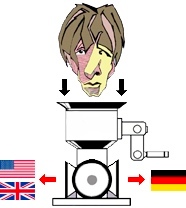| Páginas sobre el tema: [1 2] > | NMT and the future of translation; what do you guys think? Autor de la hebra: dominique roberge
|
|---|
I have looked into NMT, did some in depth research and tried to listen to both sides with an open mind. From what I gather, unfortunately for us, NMT is here to stay and will only get better with time. The more boring and technical the material, the better the machines are. Creative and rich material like poetry and philosophy is almost impossible for a machine to translate.
The problem is that a lot of translation jobs revolve around ''boring and technical'' stuff.
T... See more I have looked into NMT, did some in depth research and tried to listen to both sides with an open mind. From what I gather, unfortunately for us, NMT is here to stay and will only get better with time. The more boring and technical the material, the better the machines are. Creative and rich material like poetry and philosophy is almost impossible for a machine to translate.
The problem is that a lot of translation jobs revolve around ''boring and technical'' stuff.
The weakness of NMT is that it needs to be trained. In house built NMT can only accommodate one or few clients at a time. Training them is also a slow and expensive process. What I fear is that we might see the emergence of a ‘’super’’ NMT who can consolidate hundred if not thousands of database and offer nearly flawless translation for 99% of business needs.
Even if we don’t see the emergence of an omnipotent NMT, we can certainly expect the technology to progress in the near future. Forcing more and more LSP to use them in order to stay competitive.
This would only leave the best, well established translators, the possibility to earn a comfortable living. These translators are normally masters in their respective specialization. They can do a near perfect job and there will always be translation jobs that just can’t left to a machine. Some company will always prefer to hire the service of a true professional in order to avoid a possible disaster. However small the odds.
For the rest, from bottom of the barrel translators to average/good translators I think the picture is a lot grimmer. A lot of the translation work they are getting right now is at risk of being taken over by machine. Most of what they do can be qualified as ‘’good enough is good enough’’ gigs. Which are translations that do not have to be perfect in order to be accepted by the client. As long as the meaning of the source text is well represented and as long as there is no obvious mistakes, the client is happy to pay a fraction of the cost a human would charge.
Which mean in all honesty that beginners and students are at risk of being unable to get their foot in the door. They would have to compete with a lot of average-good translators for jobs that are now mostly translated by machines.
Maybe they should focus on learning how NMT work, become master on the terminology of a certain industry and start their own little in house LSP with a focus on their specific market?
This will not happen overnight obviously, this is a slow process where supply will slowly outpace demand (for human translation). Which in turn will lead to lower wages all across the board. This could be done over the next 3-20 years to different degrees depending on language pairs and specialization. Some who are very good and near the end of their career won’t be affected by it, while young and average translator might see their earnings plummet in the not so distant future.
I was looking into doing a bachelor in translation, I am not sure anymore. Some will say I have a self-defeating attitude and others will see my reasoning as perfectly logical. But I just don’t see how getting in a profession that is about to change on a fundamental level a good idea. Maybe I should embrace those changes and learn how I could improve my translation skill while learning how to leverage the power of an NMT to offer my own tailored LS to a specific industry.
Please let me know what you think. I hope I am wrong. ▲ Collapse
| | | |
I agree that, because of machine translation, the future for translators of the major languages looks terribly bleak.
But I don't agree that:
"Some company will always prefer to hire the service of a true professional in order to avoid a possible disaster."
Why? Why pay so much more - and have to wait so much longer - for a 'true professional' to do the work?
Even the best true professionals can also make bad mistakes. They need proofreaders, as does MT - at the moment.
| | | | | in reply to Lester | Oct 13, 2019 |
Because human will be better than NMT for a long time, at least the best translators will. Some document will require a high level of expertise, especially in very niche market where training an NMT is too expensive for the projected returns. Or for a job where perfect translation is absolutely required. I bet some companies will be willing to spend a few extra grand to make sure a multi-millions dollar contract doesn't contain any mistake.
Even the best will certainly feel the impa... See more Because human will be better than NMT for a long time, at least the best translators will. Some document will require a high level of expertise, especially in very niche market where training an NMT is too expensive for the projected returns. Or for a job where perfect translation is absolutely required. I bet some companies will be willing to spend a few extra grand to make sure a multi-millions dollar contract doesn't contain any mistake.
Even the best will certainly feel the impact of NMT eventually, but I feel they won't be affected that much in the medium/short term
[Edited at 2019-10-13 18:54 GMT] ▲ Collapse
| | | | DZiW (X)
Ucrania
inglés al ruso
+ ...
| Don't believe in hypes | Oct 13, 2019 |
After coming of MT, CAT, electronic dictionaries, encyclopedias, compilations, and their variations, year after year promoters and profiteers keep yelling in vain about "revolutions and breakthroughs".
While it's possible to describe illogical rules and historical exceptions, considering analytic and synthetic structures, yet no machine translation can replace human communication. There're at least three big non-digitizable problems--bias, context, and allegory.
... See more After coming of MT, CAT, electronic dictionaries, encyclopedias, compilations, and their variations, year after year promoters and profiteers keep yelling in vain about "revolutions and breakthroughs".
While it's possible to describe illogical rules and historical exceptions, considering analytic and synthetic structures, yet no machine translation can replace human communication. There're at least three big non-digitizable problems--bias, context, and allegory.
Hopefully, either sanitized economics or telepathy will eventually make "pure" translator profession disappear as an interim misunderstanding solution.
[Edited at 2019-10-14 01:35 GMT] ▲ Collapse
| | |
|
|
|
Samuel Murray 
Países Bajos
Local time: 11:28
Miembro 2006
inglés al afrikaans
+ ...
dominique roberge wrote:
The more boring and technical the material, the better the machines are. Creative and rich material like poetry and philosophy is almost impossible for a machine to translate.
This may have been true with previous generations of machine translation, but in my experience NMT is equally good at translating technical and non-technical material. (I'm not talking about poetry etc., of course -- I'm referring to texts that the average reader of those texts would understand without having to analyse the text as if it were art.) The strength of NMT is that it often sounds more natural. The problem is, of course, that the aim of translation is not to produce a natural-sounding text but to produce a target text that says the same as the original.
Amazingly, not all clients use NMT. A major client of mine in the pharmaceutical industry recently embraced machine translation, shaving about 50-70% off of translation fees, but they use Google's non-NMT machine for their translations. I can't understand why... the non-NMT engine is fine if you translate an entire text from scratch because it tends to be more consistent with terminology than NMT, but if you're just updating a text with, say, 30% new text, non-NMT will result in barely a 10-20% time-saving, unless you put in no effort to maintain consistency or make it sound idiomatic.
Which mean in all honesty that beginners and students are at risk of being unable to get their foot in the door.
Well, apart from acquiring skills that clients require, one thing that sets successful new translators apart is entrepreneurial skill.
| | | | Michael Davies 
Dinamarca
Local time: 11:28
Miembro 2009
danés al inglés
+ ...
| The more boring and technical the material, the better the machines are ... | Oct 14, 2019 |
While the greatest part of the material that I translate is what might (to some) be labelled 'boring and technical', as a qualified professional engineer (apart from being a translator), I do not find it to be boring ... but maybe I am biased due to my understanding of the material. Anyway, in the context of this discussion thread, I would just like to state that I do not view NMT as a replacement for my translation efforts but rather a very useful supplement.
Used properly, NMT can... See more While the greatest part of the material that I translate is what might (to some) be labelled 'boring and technical', as a qualified professional engineer (apart from being a translator), I do not find it to be boring ... but maybe I am biased due to my understanding of the material. Anyway, in the context of this discussion thread, I would just like to state that I do not view NMT as a replacement for my translation efforts but rather a very useful supplement.
Used properly, NMT can take much of the 'slog' out of translation - and save me thousands of key strokes in the process. I use it as a precursor of 2 rounds of proofreading: the first round to make sure that all ideas in the source text are also to be found in the target text; the next round to polish the language and make sure that it reads as it would if it had been 'human translated'. I am personally convinced that using NMT in this way enables me to deliver a higher quality product without spending more time on the job as well as saving physical effort in the form of keystrokes. Of course, the latter would also be possible using voice recognition but this does not suit my own personal preferences in working methods.
I am aware (and have noticed) that the quality of NMT is improving all the time, but I feel reasonably convinced that for the best quality translation work it will never completely replace the work of a good translator. ▲ Collapse
| | | |
Unfortunately, there is no such thing as “quality” in isolation. In other words, it’s not about quality of the output. It’s all about the expectations of the user of that output.
In Spain, most (if not all) the newspapers publish articles that are, to say the least, very much improvable in terms of style and grammar. However, an average Spanish reader seems to care very little indeed.
This sets a “new standard”, a poor one in absolute terms that seems to be... See more Unfortunately, there is no such thing as “quality” in isolation. In other words, it’s not about quality of the output. It’s all about the expectations of the user of that output.
In Spain, most (if not all) the newspapers publish articles that are, to say the least, very much improvable in terms of style and grammar. However, an average Spanish reader seems to care very little indeed.
This sets a “new standard”, a poor one in absolute terms that seems to be normal given the real situation.
It’s not about what it is; it’s all about who uses it. ▲ Collapse
| | | | Mihai Badea (X)
Luxemburgo
Local time: 11:28
inglés al rumano
+ ...
| Quality can be quantified | Oct 14, 2019 |
Merab Dekano wrote:
Unfortunately, there is no such thing as “quality” in isolation. In other words, it’s not about quality of the output. It’s all about the expectations of the user of that output.
It can be quantified against a standard. Do we have a standard for translation? Of course we do. As there are standards for products, there are standards for services, too. It might be helpful to make the standard more detailed, that's true.
As far as MT is concerned, of course, corporations and large agencies have their own perspective. MT technology is a significant investment and they want to get big benefits as soon as possible. Who can blame them?
| | |
|
|
|
| Find out how it works and use it | Oct 14, 2019 |
At present I still have enough clients who pay for me to do the job without the help of MT, although I could not do it without my trusty CAT for consistency.
When that is no longer the case, I can retire.
If NMT thins out the market for underpaid wannabes, who think translation is something you do for pocket money, then quite honestly, what's the problem?
Educate clients, educate clients, and keep educating clients.
Educate the general public too. Fuzzy logi... See more At present I still have enough clients who pay for me to do the job without the help of MT, although I could not do it without my trusty CAT for consistency.
When that is no longer the case, I can retire.
If NMT thins out the market for underpaid wannabes, who think translation is something you do for pocket money, then quite honestly, what's the problem?
Educate clients, educate clients, and keep educating clients.
Educate the general public too. Fuzzy logic and sloppy use of language may be funny when greengrocers (and plenty of others) do not know how to use apostrophes in English, when Danes have trouble with commas and when to use an 'r' in verbs... and whatever the problems are in any other language.
It may be harmless at that level, but if people are not conscious of how language is used, then it will be used to manipulate them.
From offers at the supermarket, to ´save´ by buying more than you want, to politicians who over-simplify the issues and lure people to cast their votes without understanding all the consequences.
I hate post-editing ordinary machine translation, but I respect colleagues who, as Michael J. Davies does, can use it to take much of the 'slog' out of translation - and ... to deliver a higher quality product without spending more time on the job as well as saving physical effort in the form of keystrokes.
He continues:
I am aware (and have noticed) that the quality of NMT is improving all the time, but I feel reasonably convinced that for the best quality translation work it will never completely replace the work of a good translator.
All sorts of crafts have become industries and embraced automation that means real craftsmen can do more interesting work, in a less dangerous working environment.
If translators get more time to get some fresh air, and less repetitive strain injury from sitting too long at the keyboard, that must be an advantage too.
I hated Trados 20 years ago - it was no real help, but now, if you hate your CAT , I would say you are using the wrong one, or not using it properly!
My father sat and translated like St. Jerome. (He used a fountain pen rather than a quill, but otherwise little had changed!) I would not have the patience now, even though that is how I started.
Meanwhile, post editing IS getting easier, and there are people willing to work with it.
Even I might come round to it one day, but don´t bet on it!
Even when NMT has taken over the widely spoken languages, there will be lots of work with languages that machines have not yet been trained to work with...
And for real aficionados of the St. Jerome methods, there are several thousand languages in the world, and some of them barely have written notation - you can develop that (DO NOT assume the 26 letters used in English will be adequate…) and you can compile the dictionaries. There is nothing for MT to bite on there.
   ▲ Collapse
| | | | | NMT is not -that- threatening | Oct 14, 2019 |
It is only my opinion, but I think even the most advanced NMT will never entirely replace a human, even for technical translation. There is always this little human component that is needed, the "mastery" if you prefer. Honestly, the only terrifying thing is the clients.
Even if NMT is not perfect, they will do anything to pay less and save time, even if it means throwing away quality. I can very well see NMT being overused, without human supervisation, but it will not be because NMT is go... See more It is only my opinion, but I think even the most advanced NMT will never entirely replace a human, even for technical translation. There is always this little human component that is needed, the "mastery" if you prefer. Honestly, the only terrifying thing is the clients.
Even if NMT is not perfect, they will do anything to pay less and save time, even if it means throwing away quality. I can very well see NMT being overused, without human supervisation, but it will not be because NMT is good, only because the market is what it is. The only thing we can do is adapt I think.
The newcomers already have a hard time getting a foot in because of the ridiculously low rates, both in translation or proofreading, and this is not because of NMT (even if it plays a role).
The only way to adapt to that is to look somewhere else. It's not a great plan but well... maybe it's better to work where what you do is recognized and appreciated. ▲ Collapse
| | | | | maybe there is hope? | Oct 15, 2019 |
I really hope I am wrong on the issue. Translation really looks like a fun and flexible career. The more I do research and the more I am torn between fear and my desire to do it. I know AI is a real danger, but unless I want to learn programming, nothing looks to be that safe anyways. Might as well try it and get in the unemployment line with everybody else when things go south.
On the bright side, maybe AI is not that bad:
1-Seems like we could see machine translation ... See more I really hope I am wrong on the issue. Translation really looks like a fun and flexible career. The more I do research and the more I am torn between fear and my desire to do it. I know AI is a real danger, but unless I want to learn programming, nothing looks to be that safe anyways. Might as well try it and get in the unemployment line with everybody else when things go south.
On the bright side, maybe AI is not that bad:
1-Seems like we could see machine translation enabling clients to request more translation thus increasing demand. Which would be alright if and only if rates remain high enough to make it worthwhile for us. If there are not enough qualified linguists to ''correct'' machine translation then price will remain high. It all depends how good the machines are if there will be enough demand to negate the fact that we will be able to translate a lot more with advanced NMT tools.
2-Another point that we might be missing here is the following. NMT could allow professional translators to skip the middlemen. It is hard right now for a translator to act as an agency, entire projects are often too long for a sole translator to complete in due time. BUT if we can increase our output with NMT, then it would be possible for translators to tackle much bigger projects by themselves. Maybe some middle size company who only need to translate their material in a few language pairs will rather work with a few translators. Thus saving them money and increasing our earnings as well? This could lead to opportunities for us as entrepreneurs.
3- AI is bound to change the world in a major way, a lot of industries are even more at risk than we are. And these are huge industries as well ; driving, medical, legal, accounting, finance, customer service, etc.
It is a sign of relief to see that even though translation looks easy and cheap to automate, the best NMT systems are nowhere near as good as human translators. Maybe there is a reason why.
I guess we'll have to wait and see. ▲ Collapse
| | | | Dan Lucas 
Reino Unido
Local time: 10:28
Miembro 2014
japonés al inglés
| Do not confuse projections with reality | Oct 15, 2019 |
dominique roberge wrote:
I know AI is a real danger
No, you don't. You have been told by the media and by others with no discernible track record in forecasting that AI is a real danger. These are predictions, not facts. Recent history is littered with grandiose claims for new technologies. Most hyperbole is eventually revealed as just that.
For an example that seems quaint and old-fashioned now, consider the 1950s predictions regarding widespread use of nuclear power and flying cars. Or perhaps the 1970s predictions of a new global ice age, or of global famine made by people like Paul Ehrlich (who was treated with all seriousness). People are very bad at forecasting, but still feel compelled to make huge, eye-catching prophesies. (cf. Extinction Rebellion.)
I would still suggest you try a different career and come back to translation later.
Regards,
Dan
| | |
|
|
|
| Extinction Rebellion | Oct 15, 2019 |
Dan Lucas wrote:
People are very bad at forecasting, but still feel compelled to make huge, eye-catching prophesies. (cf. Extinction Rebellion.)
Regards,
Dan
Completely off topic but I can't let that one go. There is a massive scientific consensus behind man-made climate change, and the need for urgent and drastic action. If you want to have a dig at ER, please back up your argument properly. Or just stick to the topic at hand.
| | | | | Could not agree more, Dan | Oct 15, 2019 |
Dan Lucas wrote:
dominique roberge wrote:
I know AI is a real danger
No, you don't. You have been told by the media and by others with no discernible track record in forecasting that AI is a real danger. These are predictions, not facts. Recent history is littered with grandiose claims for new technologies. Most hyperbole is eventually revealed as just that.
Absolutely. There is still no so-called AI that is able to understand a source text. Period. And without understanding a source text, all machine "translation" is just an elaborate imitation, the same way a parrot imitates human language. There is always the risk that you get utter nonsense (or even worse, something that sounds good but with a hidden grave error).
On the other hand, should the time come that a machine indeed were able to understand human language to the same degree a human being does, it will not make sense any more to worry about jobs and careers - such a machine would be able to do any job a human does today. And I'm convinced that translation will be in fact one of the last jobs where humans will be replaced by machines.
Rachel Waddington wrote:
There is a massive scientific consensus behind man-made climate change, and the need for urgent and drastic action. If you want to have a dig at ER, please back up your argument properly. Or just stick to the topic at hand.
I think the point Dan wanted to make was that predictions of all kinds have proven untenable, but this does not mean that the reasoning behind them was bad. Paul Ehrlich was a medical scientist of highest merit, but the predictions he made proved wrong anyway. "Extinction Rebellion" carry their prediction in their name, and you can strongly support their cause without literally believing in their prediction. The future tends to turn out even more bizarre and unexpected than all prophets paint it.
| | | | | The facts... | Oct 15, 2019 |
Dan Lucas wrote:
These are predictions, not facts.
well, I have checked personally, and for some texts NMT is actually astonishingly good... real danger? Who knows... the tool is not the danger, but how you use it...
| | | | | Páginas sobre el tema: [1 2] > | To report site rules violations or get help, contact a site moderator: You can also contact site staff by submitting a support request » NMT and the future of translation; what do you guys think? | TM-Town | Manage your TMs and Terms ... and boost your translation business
Are you ready for something fresh in the industry? TM-Town is a unique new site for you -- the freelance translator -- to store, manage and share translation memories (TMs) and glossaries...and potentially meet new clients on the basis of your prior work.
More info » |
| | Anycount & Translation Office 3000 | Translation Office 3000
Translation Office 3000 is an advanced accounting tool for freelance translators and small agencies. TO3000 easily and seamlessly integrates with the business life of professional freelance translators.
More info » |
|
| | | | X Sign in to your ProZ.com account... | | | | | |





































